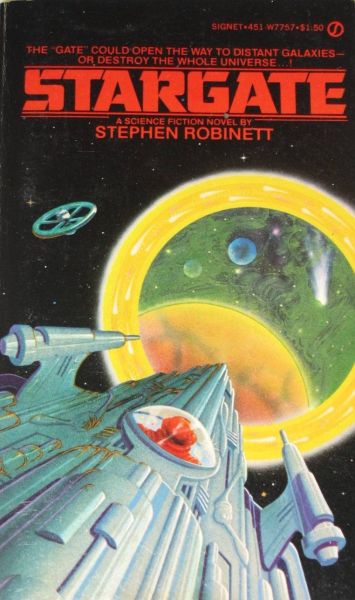Mr. Peabody’s Coal Train
Stargate
By Stephen Robinett

22 Dec, 2019
Because My Tears Are Delicious To You
0 comments
Stephen Robinett’s 1976 Stargate is a standalone SF novel set in the same universe as his short piece “Jenson’s Folly.” It was originally serialized in Analog under Robinett’s pen-name Tak Hallus. It is one of three SF novels Robinett wrote.
Downsized engineer Robert Collins needs a job. Co-worker Bernie Mitchel, also downsized, has found a senior engineering spot at Merriweather Enterprize [sic], but cannot accept it due to a heart condition. He cedes the opportunity to Robert.
The job turns out to involve cutting edge technology, corporate espionage, murder, and quite possibly the destruction of the entire Solar System.
Robert discovers that he is replacing an inventor and engineer named Norton. Norton’s project: star travel. Means: interstellar-range teleportation. The inventor was making headway on his project until he was run over and his body stolen. Too bad he didn’t believe in keeping project notes.
It’s quite likely that Norton was murdered to keep him from finishing the job for his boss, entrepreneur Merriweather. It’s also likely that whoever had Norton killed would order Robert assassinated as well.
The list of suspects is quite short: Spieler of Spieler Interstellar. Years ago Spieler dispatched a fleet of robot ships using light-speed Jenson gates to mine and retrieve ore from exoplanets. Only one in five of those ships returned, but that was enough to make Spieler a billionaire. His scheme will be worthless if anyone else can figure out how to harvest worlds using a tachyonic upgrade of Jenson’s gates.
Merriweather isn’t going to stand by and let Spieler kill another project manager. Agent Scarlyn Smith is assigned to protect Robert alive. Too bad for our protagonist that Scarlyn is more than a little past his prime. He’s a seventy-five-year-old man tempted out of retirement.
What could go wrong?
~oOo~
The economics of the set up make me scratch my head. Yes, it’s a plot point that only valuable ores are worth retrieving from exoplanets, but it seems unlikely that anyone could make a living retrieving even valuable ore if retrieval took decades.
People who remember Niven’s 1969 essay “Exercise in Speculation: The Theory and Practice of Teleportation” may recognize that the way gates work in this book as one of the methods that Niven thought would produce an extremely unstable balance of power. These gates only need sending apparatus, not receiving equipment. Anyone with malign intent can open a Jenson gate into someone’s living room and pour a bucket of kraits into that person’s lap. Or an atomic-bomb.
Norton’s gates are even worse: they can carve out large chunks of planetary crust and it can do this to bodies thousands of light-years away. If that were not bad enough, the gates are volume-limited, not mass-limited. As long as the target object fits through the gate and gate focus is not lost, the target can be dragged back to the Solar System.
Imagine you’re a sophont living on some pleasant exoplanet and all of a sudden, a robotic ship swoops down to grab a chunk of your planet and gate it back to earth1. Norton and later Robert are planning to do the same thing: blindly grab 1400 cubic kilometers of planetary crust with their long-range teleport gate, with everything on it. Imagine that you’re a sophont living on that chunk of crust. How do you feel about Earthlings now?
To his credit, Robert does wonder if it’s right to do what he’s trying to do. Still, he has a job to do and he does it2.
If the hypothetical civilization on the exoplanet has a tachyon gate, Earth’s future may be bleak. For that matter, if anyone on Earth weaponizes gates, Earth’s future may be bleak. In general, Earth’s future seems to be bleak. Better use the gates to scatter people across the universe so someone survives gate-griefers.
The novel is a standard Analog-style adventure, with a few tweaks.
- The antagonist is a businessman, not a government bureaucrat. (It’s not clear if the government is paying any attention to the Merriweather-Spieler slap fight or the implications of Norton gates.)
- The protagonist isn’t a two-fisted he-man who will do what it takes; Robert really really doesn’t want to kill anyone and doesn’t. Well, doesn’t kill anyone who’s not an alien grabbed by his gate.
- Robert’s relationship with his live-in girlfriend is dysfunctional. It’s not clear to me that author Robinett realized that. Perhaps he thought that he was picturing a healthy relationship.
I remember enjoying this book when an impressionable teen. Second time was not a charm. There is the germ of an interesting idea here, but what’s on the page is disappointingly slight.
Stargate is out of print.
1: Robots because Jenson gates aren’t all that stable over interstellar distances. Even successful jumps will kill living beings.
2: Another Robinett novel, The Man Responsible, a review of which may be found here, also resolved a pressing ethical issue by taking a narrow view of professional responsibility: clients before anyone else.
